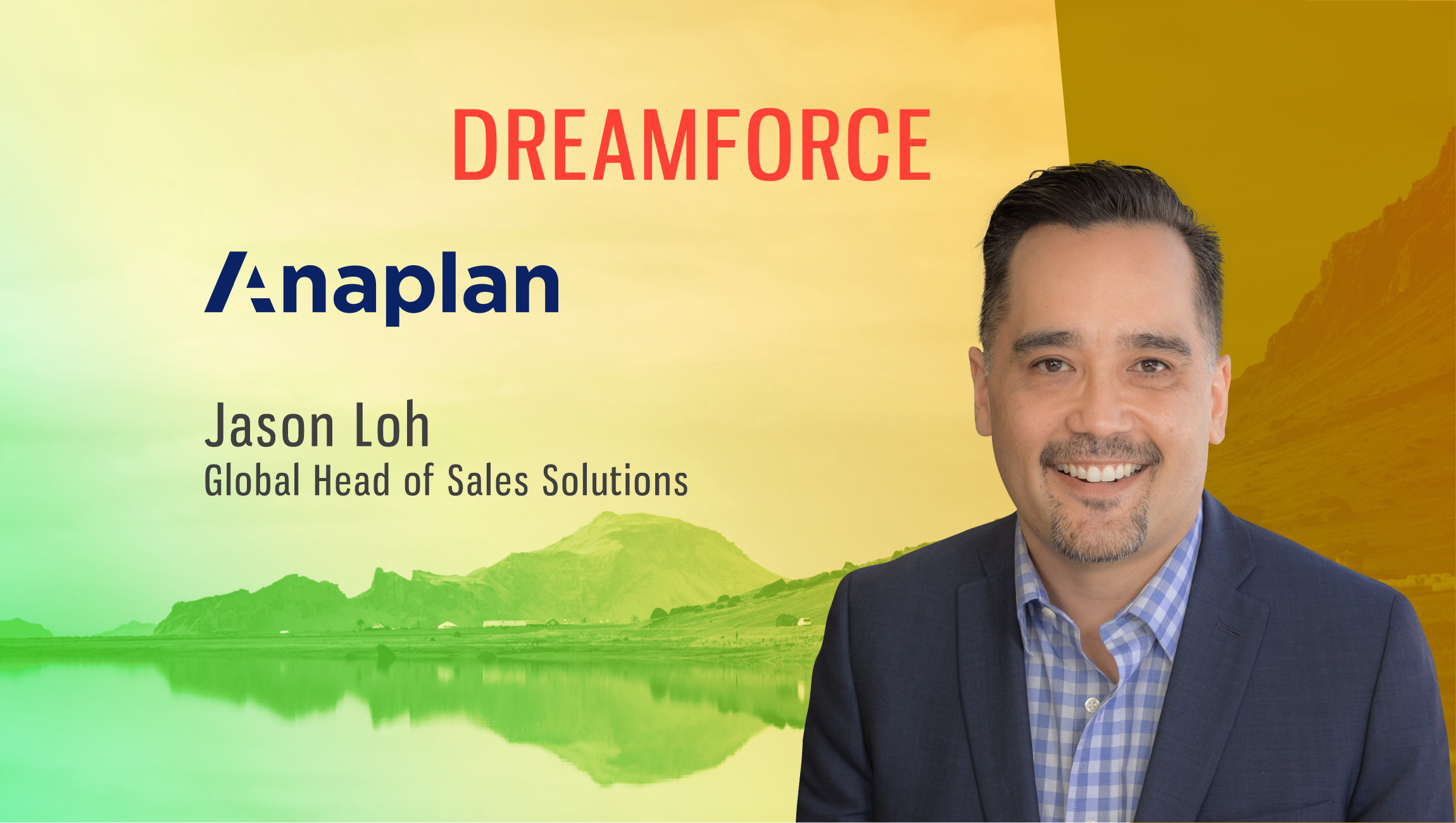Jason Loh
Global Head, Sales Solutions, Anaplan
At the ongoing Dreamforce by Salesforce event, we interviewed Jason Loh, Global Head, Sales Solutions, Anaplan. Jason shares his views on sales technology for modern sales professionals and the role of AI/ML in sales ops.
Html code here! Replace this with any non empty text and that's it.
Tell us about your journey in sales and how you reached Anaplan.
I started my career in field sales in the enterprise applications space. Like so many other sales professionals, they gave me a computer, a corporate AMEX, and pushed me out the door to sell. I cut my teeth traveling the world, racking up airline miles, and achieving lifetime platinum status at both Starwood and Marriott chains. Ha! My first sales job was at a niche CRM Marketing solution provider, which was later acquired by PeopleSoft.
I was then one of the first original hires at SAP when they first entered the CRM market. It was at SAP where I got my first taste of SPM (Sales Performance Management) applications. Eventually, I moved to Oracle where I spent 11 years growing their SPM business from the ground-up.
I left Oracle to help build a new software division for another SaaS company before joining Anaplan, where I’m currently charged with leading our sales and marketing solutions (Anaplan for Sales and Anaplan for Marketing) to bring Connected Planning to organizations around the world.
I’ve been at Anaplan for almost a year now, and I’m thrilled to be here, helping develop a product that’s already transformed business planning at hundreds of companies worldwide.
If not in sales, where and which industry would you have most likely built your career?
Like so many others, when I graduated college I didn’t expect to have a career in sales.
I often say that I didn’t go looking for this career – it found me. What drew me to sales originally was the ability to craft stories, and tell compelling narratives that helped reframe problems and present solutions. Knowing that I suppose I may have found my way into a marketing or advertising profession. Or perhaps, another line of work that involves creative problem solving, and storytelling.
How do you consume information on the latest technology news and sales updates?
As Anaplan’s Global Head of Sales Solutions, it’s my job to keep abreast of developments in both technology and sales. To do the first, I stay attuned to publications like the MIT Technology Review, Wired, the many smaller sites that chronicle the ever-changing tech world, and of course SalesTech Star.
To keep up with trends in sales, I keep track of the work done by many of our Anaplan partners: SiriusDecisions, the Sales Management Association, McKinsey, Deloitte, Accenture, and many more.
I also spend a lot of time talking to people. Customers, analysts, partners, friends: I’ll ask them all what they’re thinking about. There’s always something new to learn!
How do you prepare for an AI-centric world as a sales leader?
Over the course of my career, it’s been fascinating to observe how advanced data analysis, and now AI and machine learning, are rapidly becoming crucial parts of the sales enterprise. To be sure, sales still rests on salespeople forging human relationships with their customers. At the same time, sales leaders are able to harness AI to acquire far deeper insights into the market and deploy their sales teams in much more sophisticated ways. These insights are making sales teams significantly smarter and far more effective.
As global head of sales solutions, part of my job is to show sales leaders and enterprise companies how AI and other advanced technologies can help sales teams make better, more informed decisions.
Tell us about your expectations at Dreamforce ’18 and your preparation for the event?
I always look forward to Dreamforce! It gives me the opportunity to do two things I love: talk to customers and take the pulse of where the sales industry is heading.
This year, I’m very excited to talk about how Connected Planning helps companies leverage their CRM systems for greater value. While CRM is crucial for helping salespeople track prospects, deals, and campaigns, what a CRM can’t do—what it isn’t designed to do—is to help sales leaders manage their larger sales strategy. Territories and quotas, predictable sales forecasts, optimized pipelines, capacity plans, incentive programs: these are the things sales leaders need to stay on top of, since they make up a sales organization’s larger go-to-market strategy.
As great as CRM systems are, they’re just not designed to manage these activities, Anaplan is. That’s why I urge sales leaders to utilize a platform, like Anaplan, that enables Connected Planning because it gives sales leaders a tremendous advantage over their competition.
What is Anaplan for Sales and how different is it from other Business Planning and Performance management solutions?
Anaplan for Sales on the Anaplan platform allows sales leaders and other decision-makers to create and manage their entire go-to-market strategy, top to bottom. It gives sales leaders one place to collect and analyze data from across the enterprise, and to chart the future of their organization.
The advantage of Anaplan is that it is designed to connect every single part of your go-to-market strategy. As sales leaders know, what happens in one part of a sales organization inevitably affects everything else in it.
Changing your sales territories?
Well, you’ll also have to change your quotas. Change your quotas and you have to modify your sales forecasts. Modify your sales forecasts and you have to shift your budget. That budget affects headcount, resources, the supply chain, finance, and much more. These things all cascade into one another.
Anaplan offers the only solution that puts all these decisions into a single, shared platform. Everyone across the organization sees the same data, in real-time. Sales leaders can see how changes anywhere will affect everything else. Since Anaplan offers very robust modeling capacities, sales leaders can also try out new ideas and optimize them very quickly. This power enables better, more forward-thinking decisions.
What are the major hurdles and opportunities in connecting corporate strategy to improve sales execution?
The biggest hurdle most companies see is the disconnect between levels and functions in their organizations. The larger the organization, the more susceptible it is to fall into ossified silos. When people at different levels of a company use different data and different tools, the more likely they are to make decisions without understanding their wider impact. This, in turn, makes it exponentially more difficult to connect high-level strategy to execution in the field.
With a platform like Anaplan, functions throughout the organization remain connected at all moments. The whole company can stay aligned. This dramatically improves sales execution. It also keeps a company far more flexible, able to adapt as market conditions change.
What are the challenges to selling Anaplan’s Connected Planning platform to a global audience?
The biggest challenge in selling Connected Planning for sales is that the idea of “planning” isn’t yet a widespread term for what sales organizations do. In finance, for example, companies like Hyperion introduced the idea of financial planning almost twenty years ago. So, saying “we’re pioneering the category of Connected Planning” to finance audiences makes more intuitive sense in those contexts.
Sales, in contrast, is still very much seen as a people-focused activity, even though, as I described above, today sales teams are using data and advanced analytics to become much smarter about what they do.
The main challenge is that people in sales don’t necessarily call this work “planning.” It is planning, of course, but the challenge is getting sales leaders to put what they do in these terms. Once they do that and understand that those decisions are interconnected across their larger sales strategy, they almost immediately see the value that a platform like Anaplan’s offers.
What are the core tenets of Anaplan’s sales management solution? How does it empower sales teams to deliver?
While Anaplan’s SPM solution helps hundreds of companies with specific use cases—running incentive comp, optimizing territories, producing far more accurate sales forecasts—at its heart, Anaplan’s SPM solution is about connecting people and data across the organization, empowering everyone to make better decisions.
“Everyone” here literally means everyone: on-the-ground salespeople, frontline sales managers, sales ops teams, finance professionals, HR stakeholders, executives, and so on. By leveraging information from across the enterprise, all of these people can be smarter about what they do.
To give one example: today, performance targets are no longer one-size-fits-all. Front-line sales managers can use Anaplan to quickly develop quotas and pipeline goals individually calculated for each sales rep. Gone are the days of blanket pipeline multipliers (eg 3X, 5X). Companies can now personalize multipliers based on the selling behaviors of individual reps and roles.
Top-down numbers might come from finance, but bottom-up numbers come from assessing the TAM (Total Addressable Market), potential and white space from the accounts they have in their patch. Sales leaders can draw territories that extract more value from each account.
Pipeline health can be measured and scored across various dimensions to ensure teams focusing on those deals that most align to their company’s longer-term goals. More accurate sales forecasts let teams better allocate resources. Reduced administrative time improves efficiency throughout the organization. Greater connectivity across the org keeps companies more adaptable to changes in the market.
All of these empower teams to deliver on their performance targets.
How do automation and intelligence tools help businesses drive sales? How do they make work easier?
The easiest answer is that automation and intelligence tools can sift through large piles of data to help sales teams make smarter, more informed decisions. Which customers to target, which incentives work best, what the ROI on various campaigns is, which deals are worth pursuing and how, prices, and many more: all of these can now be approached and optimized with tools unavailable to us even five years ago.
For many years, the most successful sales teams were the ones that were the most hungry. Today the most successful sales teams are the ones that are the smartest. In today’s hyper-competitive landscape, automation and intelligence are the only way to get there.
What advice do you have for salespeople in the tech industry?
My advice to salespeople in the tech industry is threefold. First, stay up-to-date on the advances in your industry. Customers are always looking for approaches that will let them do more. The more you can show customers something that nobody else can, the greater your advantage.
Second, be prepared for change. The tech industry changes unbelievably quickly, far faster than it did for earlier generations. It’s a bit cliché, but if you don’t keep yourself flexible, or are unable to retool any of your approaches at a moment’s notice, you’ll fall behind.
Third, don’t forget that Sales is still often driven by the personal connections forged between salespeople and their customers. Technology can help you be more focused on how you go about this, but you still need to be a trustworthy, reliable advocate for your customers.
Whose answers to these questions would like to read from the industry?
I’ve had the opportunity to partner with several thought leaders and influencers throughout my career. If I had to pick one, right now I would pick Jason Jordan from Vantage Point Performance. He co-authored the Amazon best-selling book Cracking the Sales Management Code. Now he’s gearing up to release another book, Crushing Quota, later this year. He and his team perform tons of research in the world of selling. I’ve had the opportunity to partner with him several times over the years, and he always has fresh perspectives that I find insightful.
Thanks for chatting with us, Jason.
Stay tuned for more insights on marketing technologies. To participate in our Tech Bytes program, email us at news@martechseries-67ee47.ingress-bonde.easywp.com











